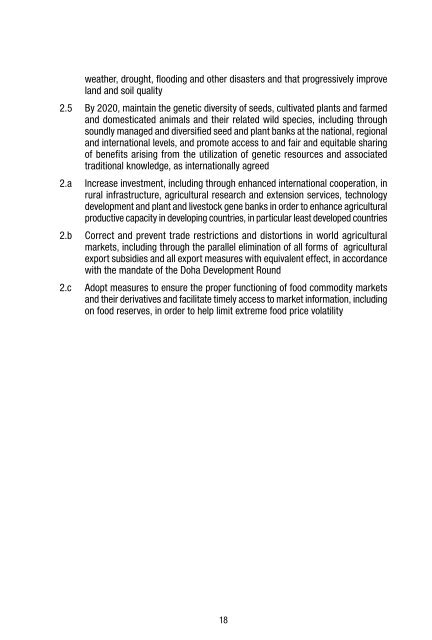The 2030 Agenda and the Sustainable Development Goals: An opportunity for Latin America and the Caribbean
The 2030 Agenda for Sustainable Development, adopted by the 193 Member States of the United Nations at the General Assembly in September 2015, outlines a transformative vision for economic, social and environmental development and will guide the work of the Organization towards this vision for the next 15 years. This new road map presents a historic opportunity for Latin America and the Caribbean, since it addresses some of the region’s most urgent priorities, such as reducing inequality in all its dimensions, promoting inclusive economic growth with decent work for all, creating sustainable cities and addressing climate change. The 17 Sustainable Development Goals (SDGs) associated with the Agenda help the region’s countries to gauge the starting point from which they set out towards this new, collective vision of sustainable development set forth in the 2030 Agenda and to analyse and craft the means of its implementation. The SDGs also represent a planning tool for the countries at the national and local levels. With their long-term approach, they offer support for each country on its path towards sustained, inclusive and environmentally friendly development, through the formulation of public policies and budget, monitoring and evaluation instruments. The 2030 Agenda is a civilizing agenda that places dignity and equality at the centre. At once far-sighted and ambitious, its implementation will require the engagement of all sectors of society and of the State. Accordingly, the representatives of governments, civil society, academic institutions and the private sector are invited to take ownership of this ambitious agenda, to discuss and embrace it as a tool for the creation of inclusive, fair societies that serve the citizens of today as well as future generations.
The 2030 Agenda for Sustainable Development, adopted by the 193 Member States of the United Nations at the General Assembly in September 2015, outlines a transformative vision for economic, social and environmental development and will guide the work of the Organization towards this vision for the next 15 years. This new road map presents a historic opportunity for Latin America and the Caribbean, since it addresses some of the region’s most urgent priorities, such as reducing inequality in all its dimensions, promoting inclusive economic growth with decent work for all, creating sustainable cities and addressing climate change.
The 17 Sustainable Development Goals (SDGs) associated with the Agenda help the region’s countries to gauge the starting point from which they set out towards this new, collective vision of sustainable development set forth in the 2030 Agenda and to analyse and craft the means of its implementation. The SDGs also represent a planning tool for the countries at the national and local levels. With their long-term approach, they offer support for each country on its path towards sustained, inclusive and environmentally friendly development, through the formulation of public policies and budget, monitoring and evaluation instruments. The 2030 Agenda is a civilizing agenda that places dignity and equality at the centre. At once far-sighted and ambitious, its implementation will require the engagement of all sectors of society and of the State.
Accordingly, the representatives of governments, civil society, academic institutions and the private sector are invited to take ownership of this ambitious agenda, to discuss and embrace it as a tool for the creation of inclusive, fair societies that serve the citizens of today as well as future generations.
Create successful ePaper yourself
Turn your PDF publications into a flip-book with our unique Google optimized e-Paper software.
wea<strong>the</strong>r, drought, flooding <strong>and</strong> o<strong>the</strong>r disasters <strong>and</strong> that progressively improve<br />
l<strong>and</strong> <strong>and</strong> soil quality<br />
2.5 By 2020, maintain <strong>the</strong> genetic diversity of seeds, cultivated plants <strong>and</strong> farmed<br />
<strong>and</strong> domesticated animals <strong>and</strong> <strong>the</strong>ir related wild species, including through<br />
soundly managed <strong>and</strong> diversified seed <strong>and</strong> plant banks at <strong>the</strong> national, regional<br />
<strong>and</strong> international levels, <strong>and</strong> promote access to <strong>and</strong> fair <strong>and</strong> equitable sharing<br />
of benefits arising from <strong>the</strong> utilization of genetic resources <strong>and</strong> associated<br />
traditional knowledge, as internationally agreed<br />
2.a Increase investment, including through enhanced international cooperation, in<br />
rural infrastructure, agricultural research <strong>and</strong> extension services, technology<br />
development <strong>and</strong> plant <strong>and</strong> livestock gene banks in order to enhance agricultural<br />
productive capacity in developing countries, in particular least developed countries<br />
2.b Correct <strong>and</strong> prevent trade restrictions <strong>and</strong> distortions in world agricultural<br />
markets, including through <strong>the</strong> parallel elimination of all <strong>for</strong>ms of agricultural<br />
export subsidies <strong>and</strong> all export measures with equivalent effect, in accordance<br />
with <strong>the</strong> m<strong>and</strong>ate of <strong>the</strong> Doha <strong>Development</strong> Round<br />
2.c Adopt measures to ensure <strong>the</strong> proper functioning of food commodity markets<br />
<strong>and</strong> <strong>the</strong>ir derivatives <strong>and</strong> facilitate timely access to market in<strong>for</strong>mation, including<br />
on food reserves, in order to help limit extreme food price volatility<br />
18


















